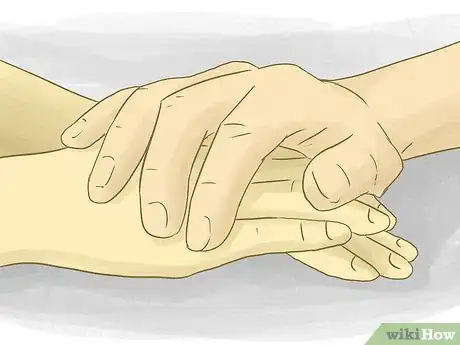This article was co-authored by Tasha Rube, LMSW. Tasha Rube is a Licensed Social Worker based in Kansas City, Kansas. Tasha is affiliated with the Dwight D. Eisenhower VA Medical Center in Leavenworth, Kansas. She received her Masters of Social Work (MSW) from the University of Missouri in 2014.
There are 9 references cited in this article, which can be found at the bottom of the page.
This article has been viewed 56,089 times.
Not having a mother present in your life can be hard for anyone. However, as a teenage girl, you are in a special transitional place where your mother’s absence may feel even more profound. Whether your mother passed away, abandoned you, or is present in your life but neglects you, you probably feel her loss on a daily basis. Learn how to cope with being a teenage girl without a mother.
Steps
Building Supportive Relationships
-
1Strive to trust others, despite your misgivings. Trust consists of the major building blocks of any relationship.[1] However, the fact that your mother is not in your life may cause you to become distrustful of others. This may be very hard as you have grown up without a bond with your mother, and that’s where we often learn to trust others. [2]
- Make a true effort to trust others and open yourself up to be more vulnerable. This may not happen all at once but closing yourself off can hurt future relationships. Be open with others about your misgivings and fears, it will help them to know what you are worried about and how to help ease your feelings. You may be surprised at how far others will go to help you if you just ask.
- Take baby steps. Share something slightly intimate with someone you have an established relationship. Assess the person’s reaction. If the person keeps your confidence and is supportive to you, then you can gradually share more and more with this person. Try this method with several people in your life, such as family members, close friends, and your favorite teachers.
-
2Try to strengthen your bond with other family members. Due to feelings of loss about your mom, you may try to push other family members away. Be aware that you may do this and try to resist pushing these people out. While your dad, grandma, or aunt cannot replace your mom, these relatives can provide you with a sense of family.[3]
- Building relationships with your grandmother, older sister, uncle, or other guardian does not mean you have forgotten your mother. However, this can provide you with some form of nurturing and support that you are lacking.
Advertisement -
3Be open to mentoring. Make a commitment to yourself to let others around you into your life. You may find a teacher or coach who attempts to take on a parental role in some form or another. Or, you may find a mentor from an outside source like Big Brothers Big Sisters or a community organization such as a church group. Take on a mentor and slowly try to build trust with this person.
- Developing strong, healthy bonds with others during your teenage years can reduce the risk of you engaging in unhealthy behaviors and help you develop better social skills.[4]
-
4Join a support group of others who understand. Whether you have lost your mother to death or she is not available emotionally, there are many support groups of people in similar situations.[5]
- A support group will help you understand that there is nothing wrong with you and you are not alone in entering adulthood without a mother. If your mother left the home, you may feel like there was something wrong with you so she could not love you. Talking with others in the same situation will help to show that this is a common misconception.
Maturing as a Woman
-
1Allow others to help you. A young woman who has lost a mother may quickly become independent. While this can be a positive trait, you must also be willing to relax the reigns and let others help you.
- You may find it is hard to trust others if your mother violated your trust by leaving. Make an effort to allow others to help and not force the rejection from your mother onto them. You may also find yourself drawn to a destructive relationship since that is what you grew up with.
- Recognize this unhealthy pattern and take steps to overcome it so that her absence does not leave a negative mark on your development.[6]
-
2Don’t expect for everyone you love to leave you. It is not unusual for you to be overly sensitive in your feelings and even to avoid getting close to others because you fear they will just leave or die. You might appear hard on the outside, but, on the inside, you are filled with fears of abandonment.[7]
- Avoidance is a big issue when trying to deal with the feelings of loss. This means you may feel like it is better to not have friends or date because you know the people you get close to will let you down. Try to talk to someone about those feelings (e.g. sibling, best friend, aunt, etc.) and come to understand that they do not transfer to everyone else in your life.
-
3Figure out what it is you value and live by that. Growing up without a mother may change the way you feel about families, but don’t fall into the trap of thinking you cannot be a good mom one day because your mom left.[8]
- If your mother left due to negative behaviors like drug addiction or factors like mental health issues, recognize that the cycle needs to be broken to avoid making that same mistake. Many times, for example, a teen mother will become a grandmother very early as her daughter is more likely to become a teen parent. You can break the cycle of the negative behavior.
- Take some time to think about the beliefs and values that are important to you in life. You might value family, honesty, loyalty, and many other things. Try to create a life that allows you to uphold these values.
-
4See a therapist to cope with identity or self-esteem issues. Your sense of self-worth could be severely impacted by not having a mother figure in your life. Because your mother is not there to guide you, you may become overly critical of yourself, jealous of other girls your age, or withdraw from social situations completely. Being open to talk about these feelings and not allowing them to overtake your life can help.
- A professional counselor or therapist can create a supportive environment for you to discuss these matters and help you build a stronger self-esteem and resolve your identity issues.[9]
Coming to Terms with Her Absence
-
1Know that you will never stop missing her. You may feel a variety of emotions depending on why your mother is not in your life. Even if your mother abandoned you and you are angry or sad about this, you will probably also never stop missing her.[10]
- You may go through a variety of emotions and certain triggers will bring those to the forefront. Things like a birthday, anniversaries or even Mother’s Day may trigger feelings. Don’t be surprised if these dates bring out a much stronger reaction than you expect, you may never fully move past not having your mother.
-
2Realize that your sense of identity has changed. Not having a mother suddenly means having a hole in your life where she used to be. If you have grown up without a mother, you may not have enjoyed the nurturing relationship many young girls may share with the moms. Expect that such a major person missing from your life will or has changed many things about who you are and how you view the world.
- Take some time to figure out how you identify without your mother. If she has passed away there will probably be a continued discussion with family about her. This may be different if she is gone for other reasons; they may just stop talking about her all together.
- The death of a parent and losing a parent due to them leaving probably feels very different though you grieve in both cases.
-
3Celebrate the time you had to spend with her, if she passed. You will probably feel sad for quite some time after her passing but don’t be afraid to also be happy when you remember the time you shared together.[11]
- Many people enjoy writing a journal to record memories or small events you may remember during your daily life. There will be things around you that remind you of her, write those happy memories down so you can enjoy them later.
- You might also visit her grave and speak with her in this way. Another option is to celebrate her life by looking through pictures of her many memories.
-
4Maintain your relationship with her through letters. You can’t ask for your mother’s advice, feel her warmth in a hug, or even see her disapproval at a choice you made. But, you can share the trials and tribulations of your life with her. Develop a regular habit of writing to her whenever you miss her most.
- These letters can be useful for both a mother who has passed and in the event that your mother is still living but not involved. You need to feel you have shared certain things with her regardless of why she is not there.
Warnings
- You may find yourself becoming angry with your mother or with the whole world at times. This is natural. Anger is a way of trying to be in control of things we can't control when we are sad and wish things were different. Try to feel the sadness instead of the anger. If you stay with the sadness, it will pass. If you try to force the sadness away through anger, you may do things you'll regret later and you'll still be just as sad or even sadder.⧼thumbs_response⧽
References
- ↑ http://www.pamf.org/teen/abc/buildingblocks/trust.html
- ↑ http://www.beyondintractability.org/essay/trust-building
- ↑ http://www.scientificamerican.com/article/how-dads-influence-teens-happiness/
- ↑ http://www.ncbi.nlm.nih.gov/pmc/articles/PMC2724162/
- ↑ http://www.griefshare.org/
- ↑ https://www.psychologytoday.com/blog/tech-support/201304/daughters-unloving-mothers-7-common-wounds
- ↑ https://www.psychologytoday.com/blog/tech-support/201304/daughters-unloving-mothers-7-common-wounds
- ↑ http://www.nytimes.com/1994/05/01/opinion/l-children-without-mothers-are-at-special-risk-954179.html
- ↑ http://www.portlandtherapycenter.com/psychological-terms/self-esteem




















-Step-20-Version-2.webp)



















































